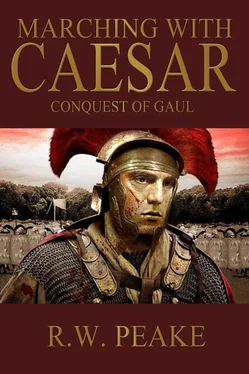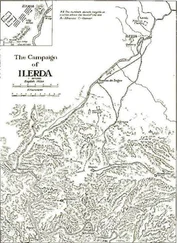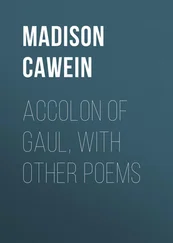R. Peake - Marching With Caesar - Conquest of Gaul
Здесь есть возможность читать онлайн «R. Peake - Marching With Caesar - Conquest of Gaul» весь текст электронной книги совершенно бесплатно (целиком полную версию без сокращений). В некоторых случаях можно слушать аудио, скачать через торрент в формате fb2 и присутствует краткое содержание. Жанр: Исторические приключения, на английском языке. Описание произведения, (предисловие) а так же отзывы посетителей доступны на портале библиотеки ЛибКат.
- Название:Marching With Caesar: Conquest of Gaul
- Автор:
- Жанр:
- Год:неизвестен
- ISBN:нет данных
- Рейтинг книги:3 / 5. Голосов: 1
-
Избранное:Добавить в избранное
- Отзывы:
-
Ваша оценка:
- 60
- 1
- 2
- 3
- 4
- 5
Marching With Caesar: Conquest of Gaul: краткое содержание, описание и аннотация
Предлагаем к чтению аннотацию, описание, краткое содержание или предисловие (зависит от того, что написал сам автор книги «Marching With Caesar: Conquest of Gaul»). Если вы не нашли необходимую информацию о книге — напишите в комментариях, мы постараемся отыскать её.
Marching With Caesar: Conquest of Gaul — читать онлайн бесплатно полную книгу (весь текст) целиком
Ниже представлен текст книги, разбитый по страницам. Система сохранения места последней прочитанной страницы, позволяет с удобством читать онлайн бесплатно книгу «Marching With Caesar: Conquest of Gaul», без необходимости каждый раз заново искать на чём Вы остановились. Поставьте закладку, и сможете в любой момент перейти на страницу, на которой закончили чтение.
Интервал:
Закладка:
While we were in camp along the Sabis, a deputation of Nervii consisting totally of old men who were clearly past their prime as warriors approached the camp, asking Caesar for an audience. It was granted, whereupon they were brought into Caesar’s presence, a curule chair on a dais placed in front of the Praetorium , with a formation of all the army called to witness what transpired. In front of our hostile eyes, the Nervii elders threw themselves on the ground in front of the dais to beg Caesar for mercy. They claimed that of the 60,000 men we faced, only 500 remained, and had joined the women, children and old people of the tribe in their sanctuary in the middle of a swamp some miles distant. It would turn out the numbers of the slain turned out to be exaggerated, but it seemed credible at the time; we had tallied the dead that we buried, and the number was fifty-three thousand. However, we had not gone into the forest and we made the assumption, mistaken as it turned out to be later, that the remainder were seriously wounded and gone into the woods to die. What we were unable to determine was which of the bodies were Nervii and which were the other tribes. They had been dragged from the areas where they fell into one huge pile before anyone had thought to count by tribes. Therefore it passed that these numbers claimed by the Nervii elders were accepted; later enemies of Caesar would claim that he exaggerated the numbers for his own personal gain. The goal of this narrative of mine is not to defend Caesar, so I would only point out that those who say such things were not there, so to my mind, they are not credible.
Caesar accepted the surrender of the Nervii, choosing not to inflict any punitive punishment on them, deeming that they suffered enough humiliation by the destruction of their huge army. In fact, he allowed the Nervii to return not only to their farms but to their towns, even those that were fortified, and decreed that the tribes surrounding them should not harass them in any way. In fact, he went so far as to declare that their neighbors should provide whatever assistance that was needed. It speaks much to the character of Caesar, and to the respect that he had earned, albeit through our right arms, that his orders were obeyed without protest, even by tribes who were hereditary enemies of the Nervii for many generations. We also were informed that there was another tribe, the Aduatuci, who had been marching to join the Nervii, but on hearing of their defeat turned around and marched back to their lands. This tribe made the decision to abandon all of their other towns and gather their forces in their strongest position, a town on a river that was very similar in nature to Vesontio. On hearing of this, Caesar gave the orders to prepare to march, and it was this command that forced the decision of who would be the Centurion of our Century and Cohort. Consequently, the night that the orders to march were issued, as we sat around our fires, the Primus Pilus came up to us with another Centurion with him, a man two or three inches shorter than me, but with a slender build. He had aquiline features that could have been called handsome except for the scar that ran diagonally across his face, starting at the corner of his right eyebrow, running under his right eye and downwards to the edge of his right nostril, continuing diagonally across his lips and ending at the base of his jaw on the left side. The scar had cut the nerves in the region of his mouth, so his upper lip curled into what appeared to be a permanent sneer. His eyes were somewhat hooded, and were such dark brown that they appeared black, giving his gaze the same fierce countenance as an eagle. He carried his vitus in his right hand, and was tapping the end of it in his left as the Primus Pilus spoke to us.
“This is your new Pilus Prior, Centurion Vibius Piso. He's from the 9th Legion and is now in the 10th.”
This caused a bit of a stir, and I am afraid our unhappiness was evident, but since this was the last stop in the Century, I was sure that the two Centurions were not surprised, and in truth, probably understood.
When our new Pilus Prior spoke, it was in a deceptively soft voice, and it was on this occasion that we were introduced to a different style of command than we were used to. Centurion Piso rarely raised his voice, but he possessed other ways of getting our attention that were just as effective. “As the Primus Pilus said, my given name is Piso, but I'm more commonly known as Pulcher,” he pointed to his face, “because I'm easily the handsomest man in this army.”
This brought a laugh from us, and our distrust for him eased a bit as he continued. “I'm extremely proud to have been selected for this post, and I'm equally proud to be in the mighty 10th Legion.”
So far, he was hitting all the right notes, but he still had some ground to cover. Oh, we would obey him to the letter like we were trained, except there is a vast difference between forced obedience and willing obedience, and that is the key to good leadership, making your men want to obey because you are the one giving the orders.
The new Pilus Prior finished, “I’m not going to say that I expect every man to do his duty, because the reputation of not just this Cohort but this Century is well known, so I’ll close with saying that I’m proud to be your Pilus Prior.”
Now, whether or not our reputation was as glorious as he made it out to be, one can never underestimate the importance of flattery to soldiers’ egos, and more important than whether it was true or not was the fact that we wanted to believe it. The introductions done, we returned to our work of preparing to march the next day. Rufio was staying put, at least for a while, since he was most familiar with the men of our Century and would be of assistance to the Pilus Prior in learning our ways. Hearing from our friends in the other Centuries that there were some muttered complaints about bringing in a Centurion from another Legion, we also discovered that our new Pilus Prior was something of a legend, not just in his own Legion, but with the older men who had been in Pompey’s army that fought Sertorius. With the question of leadership settled, not just in our own Century but throughout the army, we marched out of the camp, leaving behind a mass grave and memories of the toughest battle we had faced yet.
Marching east again, we followed the course of the river Sabis until it met the Mosa (Meuse) River, which continues in the same east-west direction while the Sabis branches off. At the end of our third day of marching, our scouts reported that they spotted the town where the Aduatuci had taken refuge, a few miles ahead. Instead of stopping at our normal time, Caesar ordered us to march closer so that we would be within sight of the town when we made our camp for the night. The next morning, we were marched out in force and arrayed for battle so that the Aduatuci could see what they were facing, while Caesar, his staff and the Tribunes made a reconnaissance of the area surrounding the town. We had been told that this place was much like Vesontio, which was only accurate to a point. If anything, this town was even better situated, the hill that it perched on skirted by steep escarpments of rock almost all the way round its base, making assaulting it from almost any direction terribly difficult. The only vulnerable side was on the northeast, where the slope was gentler, but to counteract this obvious weakness, the Aduatuci had erected not one, but two high walls, there being a space of perhaps a hundred feet between the inner and outer. Once Caesar was satisfied that he had seen everything he needed to, he issued orders and we went to work. He directed several projects to be started, starting with the construction of a rampart a few hundred feet away from the walls of the town, running east and west on the north side of the hill, with the river as the boundary for each end, effectively cutting off the town sitting in the bend of the horseshoe. Meanwhile, he directed the building of an earthen ramp to be built on the northeast slope that would accommodate the rolling of a siege tower up to the wall, along with enabling a series of mantlets to be connected so that a battering ram could be conveyed to the wall to make a breach. Building the ramp was assigned to us, while the construction of the siege tower took place out of the range of the Aduatuci missiles, but within plain sight so that they could see what was coming their way. For their part, the Aduatuci were singularly unimpressed; they ranged along the walls all the way around the town, calling out insults to us, which of course we did not understand at first. It did not take them long to find Latin speakers among them, and it was they who began to mock us.
Читать дальшеИнтервал:
Закладка:
Похожие книги на «Marching With Caesar: Conquest of Gaul»
Представляем Вашему вниманию похожие книги на «Marching With Caesar: Conquest of Gaul» списком для выбора. Мы отобрали схожую по названию и смыслу литературу в надежде предоставить читателям больше вариантов отыскать новые, интересные, ещё непрочитанные произведения.
Обсуждение, отзывы о книге «Marching With Caesar: Conquest of Gaul» и просто собственные мнения читателей. Оставьте ваши комментарии, напишите, что Вы думаете о произведении, его смысле или главных героях. Укажите что конкретно понравилось, а что нет, и почему Вы так считаете.












